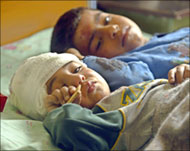Misery in Baghdad’s ailing hospitals
A child’s battle against cancer is always wretched. But it’s far more difficult in Baghdad where chemotherapy treatment is in short supply.

Playing half-heartedly with a toy truck, Ahmad looks no older than four, but his mother says he is eight. Diagnosed three years ago with leukaemia, Ahmad has fought to survive.
Before the US-led war in March 2003, chemotherapy treatments had successfully wiped out the cancer from his bone marrow. He started receiving a monthly chemotherapy treatment to ensure there would be no relapse. His mother of three, Lamiaa, said he was on the road to recovery.
Then the war started
Suddenly, Lamiaa and her husband were unable to reach Baghdad from their home in Baquba 65km away, because occupation forces were blocking the roads.
When they finally did reach al-Iskan Children’s Hospital in the capital where Ahmad was receiving treatment, they were told the hospital had almost run out of his medication. Doctors only option was to cut the treatment by half.
“What could I do, there was nothing else,” says Lamiaa.
Almost one year on, and tests show that cancer has invaded 70% of Ahmad’s bone marrow. He is also suffering from infections due to his poor immunity system.
|
“I read about the medical developments in America and that’s all I can do – read about them.” Dr Qassan Ali Abd, |
Basic needs
Iraq’s hospitals lacked basic medical supplies before the US-led war. From 1991 until 2003, a stifling United Nations-imposed blanket embargo meant that hospitals could not get up-to-date equipment or technology. Medicine was also limited.
It could hardly have gotten worse, but it has.
Today, patients at al-Iskan – the city’s main paediatric hospital – have to buy everything, including IV tubes because the hospital does not have any.
In one of the six beds with cancer patients, 11-year-old Yaman’s aunt Laila says the hospital no longer has syringes to draw blood. When her nephew needs a blood test to monitor his leukaemia, doctors prick him with a needle and allow blood to drip into a tube.
Lamiaa nods in agreement. “We even have to buy blood transfusions sometimes and it costs 20,000 dinars,” she says, over-whelmed by the amount. It is the equivalent of about $12, but a small fortune to the family since her husband has been out of work since the start of the war.
Disillusion
“He is a high candidate for a bone marrow transplant but we don’t have the facilities,” said Dr Qassan Ali Abd, one of Ahmad’s doctors. Chemotherapy after a patient has relapsed is not the best treatment, but it is the only one currently available to them.
During Eid al-Adha festival, earlier this month, eight children in the ward had died, he said bitterly.
“It is the same situation since 9 April until now, the same suffering-for patients and doctors,” he said, in reference to the day US and British tanks rolled into Baghdad last year.
“I expected when the Americans came here that in a month things would be normal,” he said.
 |
|
Iraqi hospitals are ill-equiped to |
The frustrated doctor says he does not expect facilities for bone marrow transplants within a month, but certainly hopes basic necessities for the country’s main children’s hospital to function.
When asked why there was a shortage of cancer medications, he said: “The country is occupied. It is destroyed. Drug storages were looted and burnt to the ground.”
Frustration
Abd has been working at al-Iskan for the past three years. “But I do nothing. We don’t have the facilities,” he says. “I read about the medical developments in America and that’s all I can do – read about them,” he said.
Dr Ahmad Abd Al-Fattah, the hospital’s assistant manager, admits specialised treatments, like cancer therapies, are in short supply. During the crippling UN sanctions, some of the medications were unavailable not only for financial reasons, but for political ones, said al-Fattah.
Some of the drug makers were in the United States and United Kingdom and Baghdad had no access to buying them, he said. However, with the capture of toppled leader Saddam Hussein, this is changing, said Abd al-Fattah.
But the patients and parents on the second floor of al-Iskan hospital cannot afford to wait any longer.
When asked if Ahmad would live, Abd offered a weary look and after a pause said: “I hope so. I hope they all will.”